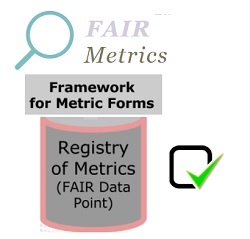FAIR Metrics : Framework to understand how increasing the FAIRness is ...
14/02/2018


In the last years, a lot has been going on in the space of FAIR (Findable, Accessible, Interoperable, and Reusable) data and other online resources, to make them comply with the 15 Principles of FAIR Data (as they were originally stated in the “The FAIR Guiding Principles for scientific data management and stewardship“).

To understand how increasing the FAIRness of digital resources might maximize their reuse, we need to evaluate the FAIRness of digital objects (DOs) through metrics, - to obtain an assessment that provides feedback to content creators about the degree that they enable others to find and reuse DOs.
This means, that communities should not only understand what is meant by FAIR, but also be able to monitor the FAIRness of their digital resources, in a realistic, but quantitative manner.
|
"FAIRness - the degree to which a digital resource is Findable, Accessible, Interoperable, and Reusable - is aspirational, yet the means of reaching it may be defined by increased adherence to measurable indicators", - A design framework and exemplar metrics for FAIRness, by Wilkinson e t al., bioRxiv, 2017 |

The GO FAIR Metrics Group focuses on the development of such metrics to assess compliance to each and every one of the FAIR principles. To this end, the group has created a cogent framework for developing FAIR metrics manifested as a simple form with questions that structures fruitful conversations about proposed metrics.
The group has created several exemplar metrics that could be broadly applicable; however, additional metrics may be designed and published through the group's open submission process, or simply shared within your community through your normal communication channels.
|
The groups' proposed FAIR Metrics can be found HERE. |
The approach proposed to publishing FAIR Metrics is, itself, FAIR...
This takes the form of a FAIR Accessor (a kind of Linked Data Platform Container), which describes :
- a subset of metrics,
- the community to which they are applicable,
- other relevant metadata, and
- links to each of the associated metrics metadata documents. These metadata documents are written in YAML, and follow the smartAPI annotation patterns for Web Services. As such, each of these documents contains a link to the Metric itself - a Web interface capable of testing a resource's compliance with that metric.
|
FIND OUT MORE HERE for ongoing and planned activities of the GO FAIR Metrics Group. |
RELATED: 
- The FAIR principles as published by FORCE11
- The FAIR Guiding Principles for scientific data management and stewardship - Nature article (2016) launching the FAIR concept. "Throughout the Principles, we use the phrase ‘(meta)data’ in cases where the Principle should be applied to both metadata and data”
- Explanation of the FAIR Data principles by the Dutch Centre for Life Sciences
- GO FAIR (Global Open FAIR) is a self-governed, community-driven initiative to accelerate the early development of the Internet of FAIR Data and Services.
- GO TRAIN ImplementationNetwork as part of the wider GO FAIR initiative
- FAIR Webinar series : #1 Findable #2 Accessible #3 Interoperable #4 Reusable (recorded ANDS webinars)
- Take part in a FAIR Data Survey about the increasingly open use of Data in Science
- FAIR principles and metrics for evaluation (SlideShare, 2017)
- FAIRsharing : Find, Register, Claim your Standard, Database, and Policy
- Enabling FAIR Data Project (COPDESS: Coalition on Publishing Data in the Earth and Space Sciences)
- Watch the recording of the RDA webinar “Are we FAIR yet?”
- Metrics Toolkit : a resource for researchers and evaluators that provides guidance for demonstrating and evaluating claims of research impact
- FAIRsharing adopters & collaborators
- FAIR in Practice (RDA blog)
- Metrics and Indicators in Agricultural Sciences (IGAD of the RDA)
- FOCUS ON INTEROPERABILITY FOR... FOOD & AGRICULTURE [+ IGAD pre-meeting: “FAIR principles to all elements of the research process in agricultural sciences and related disciplines”, March 19-20, 2018, in Berlin, Germany]
- Interoperability Standards - Digital Objects in Their Own Right. Wellcome Trust Report : This report focuses on the wealth of content standards - available in the life and biomedical sciences - ensuring that digital research outputs are FAIR
- Try free interactive Data Skills Training Modules (from UK Data Service)
- CESSDA shares online data management guide with expert tips on all stages of the research data life cycle
- European Open Science Cloud (EOSC) and FAIR data principles:
* Interoperability in practice and FAIR data principles
* How to make EOSC services FAIR? Experience and challenges
* Revisiting the FAIR principles for the European Open Science Cloud
